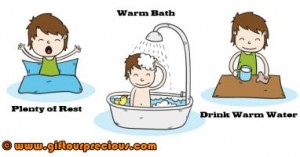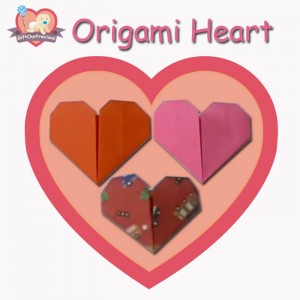10 Natural Cold Remedies for Infants and Young Children
The weather has been rather wet and cold recently, and my son, Leeroy is getting some mild cold symptoms such as running nose and an occasional cough. Below are 10 natural remedies which we found help relieve cold symptoms and majority of them have been adopted by us to relieve Leeroy of his cold symptoms.
1. Get plenty of rest and sleep (For all ages)
Try to get your little one to be as comfortable as possible, and encourage him to rest and sleep more as the body needs energy to fight off viruses and to heal. Having enough rest and sleep are important to keep the immune system strong and healthy. Give him his favourite cuddly toy, keep him comfortably warm and cosy, and play his favourite lullaby.
2. Go out for some sunlight for a dose of vitamin D (For all ages)
There are several studies that show correlation between the amount vitamin D level and respiratory tract infections. The higher the vitamin D level is shown to reduce the risk of getting respiratory tract infections such as colds and flu. Hence bring your child out for a walk in the park for a healthy dose of sunshine to build his immune system against the cold virus.
3. Humidifier and/or cool-mist vaporizer (For all ages)
Breathing moist air helps to relieve your baby’s breathing by clearing the congestion in the nose when it loosen the mucus in the nasal passages. Place a humidifier or a cool-mist vaporizer in the room where your baby rests, sleeps and plays. But remember to clean your humidifier frequently as it tend to accumulate mold over time.
4. Steamy bathroom (For all ages)
Steam cleaning helps to loosen the mucus and phlegm, thereby clearing the congestion in the nose and chest. For infant and young child, you can convert your bathroom into steam room by sitting in the bathroom for 10 to 15 mins with closed door and running hot shower. It is best if you are able to do steam cleaning every morning and before bed with your little one. But do beware to keep the hot water away from splashing onto him.
5. Very Warm bath (For all ages)
The warm moist air from the warm bath will help to loosen the mucus in the nose, thereby helping your child to breathe better. Warm bath also helps to relax the child and works well in bringing high temperature down if your baby has a fever too. Do check that the water temperature is comfortably warm for the baby.
6. Saline drop and bulb syringes (all ages)
Saline drop, also known as salt water, helps to loosen the mucus in the nose, thereafter the mucus can be sucked out with a bulb syringe. This is helpful to relieve your baby who may have problems eating and drinking due to congestion in the nose. You can drop 2 to 3 drops of saline drop into each nostril and try to hold your baby’s head still for 30 sec, squeeze the bulb to force out air, gently insert the tip of the syringe in his nostril, and slowly let the air out. Clean the syringe and repeat if necessary.
It is easy to make your own saline solution, all you have to do is mixed ¼ teaspoon of salt (non-iodized) with 1 cup of boiled warm water (do not use untreated tap water as it may contain micro-organisms that may cause infections in nose passage).
Do note the following:
- Do not use the bulb syringe for more than a few times a day as it may irritate the nose lining.
- Do not use saline drop for more than 4 days consecutively as it may dry up your baby’s nose.
7. Elevating the head (all ages)
To help your child breathe better, you can elevate your child’s head. This can also help to stop postnasal drip which can result in coughing.
Do take note that pillow can smother your baby if he rolls face down, hence please ensure pillow is placed under the mattress instead of under the baby’s head, especially for baby under 6 months old.
8. Plenty of warm fluids (6 months old and above)
Ensure your little one have plenty of warm fluid, as warm fluid can help to relieve congestion and prevent dehydration. But do note that infant under 6 months old is better to stick to breast milk or formula, unless advice by doctor, as water may reduce the infant’s appetite and cause him to be malnutrition. Infant having too much water may cause him to be salt -depleted due to the kidney flushing out sodium and electrolytes. In serious cases, this can cause seizures.
If your baby is more than 6 months old, you can serve him some mild warm chamomile tea, chicken or vegetable soup.
9. Honey, Lemon and Ginger (12 months old and above)
Honey, ginger, and lemon have long been known for their homoeopathic properties. Combining them together makes a great remedy against combating cold, infection and even flu symptoms. Below are some properties of these ingredients.
- Honey: anti-tumor, anti-inflammation, antibacterial, antioxidant and antiviral
- Ginger: anti-inflammation, helps digestion, antiviral and effective against human respiratory syncytial virus
- Lemon: antiseptic, magnesium, vitamin C, bioflavonoids, aids digestion and great source of calcium
Study done on, 270 children between 1 to 5 years old with cough cause by cold shown that children who were given honey 30 mins before bedtime cough less often and less severely than children who were not given honey, hence they can sleep better at night.
For your child older than 1 year old, you can serve a little honey or warm honey drink with ½ to 1 teaspoon of honey or up to 2 teaspoon for a child older than 2 years old. Add a little grated ginger or some warm ginger tea, and squeeze in a few drops of lemon juice for a great remedy to combat cold.
Important note: Honey can cause botulism for baby under 1 year old, hence do not give honey to your baby under 1 years old.
10. Nose blowing (2 years old and above)
Teach your child to blow his nose to clear the mucus from his nose. This helps your child to breathe better. You can start showing your child how to blow his nose from 2 years onwards, but do not worry if he does not master it well as some child will only master nose blowing after 4 years of age. Some tips below on teaching your child nose blowing.
Nose Blowing Tips:
- Parents can nose blow in front of your children. Children loves to copy their parents and for some children, that’s all it takes for them to pick up the skill.
- Have your child practice blowing his nose on 1 side of his nostril. Assist your child to hold one nostril shut and ask him to blow gently and subsequently change to the other side.
- Teach your child to blow gently as blowing too hard may hurt his ears.
- Make it fun by having a nose blowing games together with your child. You can blow 1 time and get your child to follow you and thereafter you can blow 2 times and get the child to follow you to blow 2 times. You may also change the rhythm of your nose blowing and get your child to follow.
- Give him a packet of his very own tissue, there are some tissues with cute cartoons that child will like.
- Teach him good hygiene and remind him to throw the used tissues into the trash bin, wash his hand with soap, or sanitize his hand with hand sanitizer after nose blowing so as not to spread the virus.
- If there are redness and sores on your child’s nose from all the nose blowing, you can apply a little petroleum jelly or aquaphor around his nostrils. You may want to consider using warm wet soft cloth to wipe the nose instead of tissue, as this can reduce the chances of getting nose sore, although this also means constant washing of the wash cloth.
Do leave us a comment below if you know of other natural cold remedies not mentioned above.
Other Resources
Why Is Play Important In The Parent Child Relationship
Free weekly planner printables


